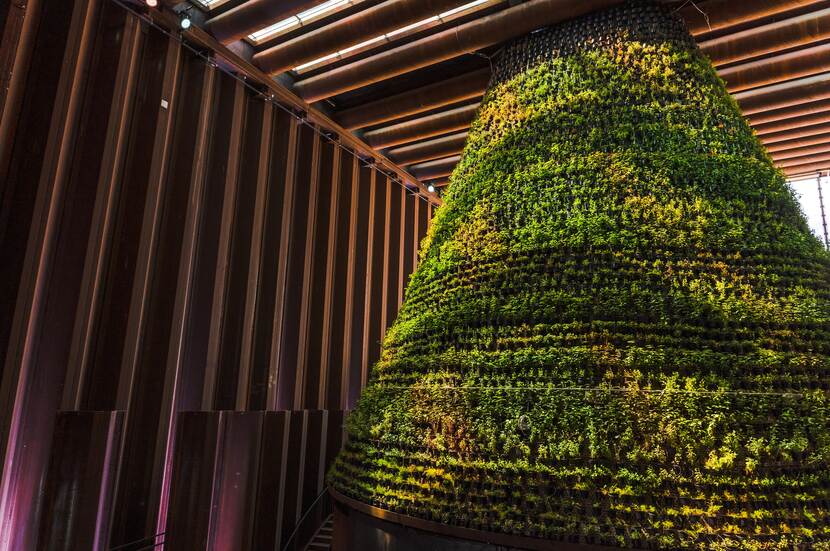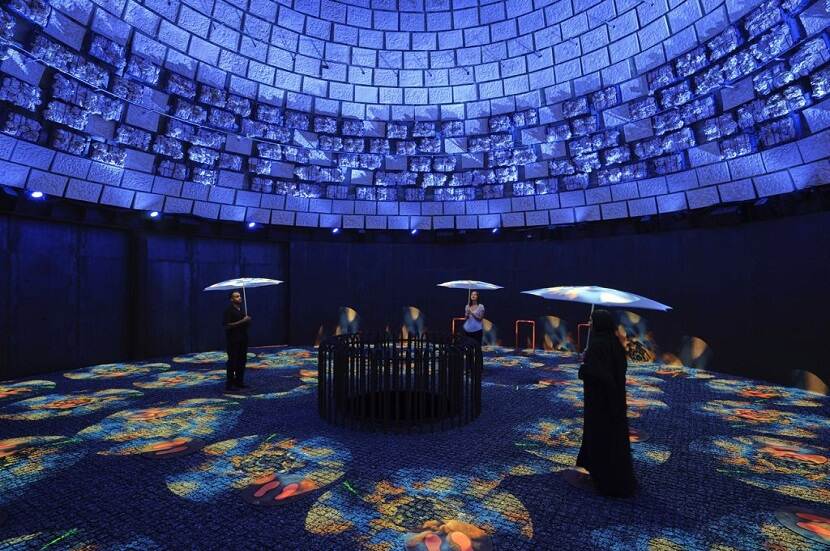Dutch innovations connect water, food and energy at Expo 2020 Dubai
To feed the growing world population, we need to rethink the way we use scarce natural resources. At Expo 2020 Dubai, the Netherlands presents the world with innovative solutions to global problems in the areas of water, food security and renewable energy. The Dutch contribution is the result of close cooperation between a consortium, the business community and individual innovators – designers and artists. The Netherlands Pavilion showcases their work.
Through its participation in Expo 2020 Dubai, the Netherlands offers a platform for businesses, knowledge institutions and other organisations in the public and private sectors to strengthen their position in the Gulf region. There are strong economic ties between our country, the United Arab Emirates (UAE) and the rest of the Gulf region. Expo 2020 Dubai is an outstanding opportunity for deepening these long-standing relations.
The pavilion was designed and built by a consortium made up of V8 Architects, Kossmanndejong, Witteveen+Bos and Expomobilia. They in turn involved many other innovative Dutch companies, including Leadax, Koppert Biological Systems, Hoogendoorn, MJTech, Holland Water, Signify and BOM Group. Construction materials were leased from local parties where possible, so as to minimise transport. The pavilion’s interior has also been made using leased materials. After Expo, everything will be taken down and the materials returned or reused. This approach minimises the pavilion’s ecological footprint.
Michiel Raaphorst, architect and director of V8 Architects, explains: ‘The Netherlands Pavilion demonstrates why architecture is relevant. It presents key themes like circularity and possible solutions to water, energy and climate issues in a way that isn’t just technical but, above all, inspirational. These solutions don’t estrange us from our surroundings but enrich our environment. The problems we face are ugly, but the solutions are beautiful and inspire hope.’
Biotope
The Netherlands Pavilion at Expo 2020 has been designed as a biotope. Here we show how the water, energy and food sectors can combine their strengths to produce innovative solutions to global challenges. Food is grown, water is harvested and electricity is generated – all in a circular climate-controlled system. Dutch innovations are at the heart of this concept.
Ap Verheggen and SunGlacier Technologies developed the solar-powered rain shower. The innovative SunGlacier unit in the pavilion is capable of producing hundreds of litres of clean water every day. SunGlacier’s guiding principle is that clean water should be available for every person on the planet,
Ap says. ‘To do this, we’ve developed a clean, highly efficient method to extract water from air. Sunshine, gravity and air are everywhere. We use these free elements as efficiently as possible to produce clean, cold water from the air outside,’ he says. ‘Because our units are so efficient, you can also hook them up to a solar energy system. It’s fantastic that we can demonstrate this technology, that works almost everywhere on earth, at scale at Expo 2020 Dubai.’
The SunGlacier unit in the Netherlands Pavilion is powered by ‘stained glass’ solar panels, designed by Marjan van Aubel. The solar panels are also skylights, letting in daylight that the plants need for photosynthesis. ‘Besides generating energy, sunlight is beautiful too,’ Marjan says. ‘We made the Netherlands Pavilion’s solar roof using organic solar cells in many different colours. This new material will allow us to better integrate the sun’s energy into our everyday lives in the future.’
BuroBELÉN designed the curtain separating the business lounge from the visitors’ area. The custom-made fabric is 22 metres wide and 14 metres long. Mogu supplied the biobased floor tiles and acoustic wall panels in the lounge. Both are made from dried mycelium, the vegetative part of mushrooms.
Rain in the desert
Visiting the pavilion is a sensory experience. Even the olfactory organs are titillated – with the scent of the Mastenbroek polder wafting from a machine designed by Birthe Leemeijer. On entering the pavilion, visitors are treated to a fascinating choreography of visual and graphic elements, which explains how our planet seeks to balance water, energy and food, and shows how the Netherlands plays a leading role in developing innovative solutions to these global challenges.
What makes a visit to the pavilion so special is that visitors are taken on a journey through an innovative climate machine. Mark de Jong, partner at Kossmandejong, tells us more about it: ‘The idea is not only to teach visitors something, but to let them feel it. To give them a unique experience that will stay with them forever. Visitors will be given white parasols on which the journey past the pavilion’s innovations is projected. The climax will be a spectacular, sudden rainfall beating down on them from 18 metres higher. This “wow” moment gives visitors a deeper emotional perception of what they’ve been taking in cognitively. You don’t just understand it, you feel it.’
Programme of events
The pavilion is more than a showcase for Dutch innovation, knowledge and experience. It is also a place where businesses, knowledge institutions, public bodies and civil society organisations can network, share knowledge and together show visitors what they have to offer. The pavilion has room for business events. The programme ties in with major events at Expo and the UAE. For those who cannot come to Dubai in person, all events in the Netherlands Pavilion will be recorded as well as streamed live worldwide.
At Expo 2020 Dubai, efforts are made to come into contact with interested parties in the UAE and elsewhere. The Netherlands’ programme is therefore linked to other major events at Expo. The Netherlands’ National Day celebration will be on 3 November – the day on which the pavilion will be officially opened and welcome the first large Dutch trade mission. The National Day also marks the start of the cultural programme.
The programme includes thematic weeks to facilitate contact between stakeholders from a specific sector. Between 3 October 2021 and 26 March 2022 there will be thematic weeks on climate, healthcare, agriculture and water. These weeks are expected to be popular with delegations from around the world. You can find these in a detailed week-by-week calendar of events.

